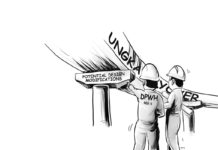[av_one_full first min_height=” vertical_alignment=” space=” custom_margin=” margin=’0px’ padding=’0px’ border=” border_color=” radius=’0px’ background_color=” src=” background_position=’top left’ background_repeat=’no-repeat’ animation=”]
[av_heading tag=’h3′ padding=’10’ heading=’Writ of habeas corpus’ color=” style=’blockquote modern-quote’ custom_font=” size=” subheading_active=’subheading_below’ subheading_size=’15’ custom_class=”]
BY OSCAR CRUZ
[/av_heading]
[av_textblock size=” font_color=” color=”]
IN ITS more plain and simple understanding, a writ is an official court order. And together with habeas corpus, it means an order from the competent court releasing to it someone detained for a perceived wrongdoing as provided by law.
Among other things, the said writ is founded on the presumption of innocence until someone is proven guilty. So it is that when the said “writ” is suspended for one reason or another, an individual caught and detained supposedly for the commission of a crime is held guilty until otherwise proven innocent.
Thus the 1987 Constitution of the Republic of the Philippines reads: “The privilege of the writ of habeas corpus shall not be suspended except in cases of invasion or rebellion when public safety requires it.” (Bill of Rights, Section 15) The fact is that the very first Section of the said Bill of Rights reads: “No person shall be deprived of life, liberty or property without due process of law, nor shall any person be denied the equal protection of law.”
Questions: Shall the incumbent administration suspend the writ of habeas corpus? Is there an actual or perceived invasion from the right? Is there a de jure or de facto rebellion from the Left?
What will happen next? How would the general public react to the suspension? Will they take it simply in silence, sitting down, keeping still – or would they object thereto for one reason or another?
More questions: When the said writ is suspended, what follows next? Will there be peace and quiet all over the land? Or would certain sectors of society in effect instance a rebellion of one kind or another?
Then what? What follows next? What happens then?
All the above and these questions raised plus other queries thereto relevant only mean one and the same thing: The suspension of the writ of habeas corpus means very much more than it says – given the immediately past and now present public authorities. Hence, needless to say, the suspension of the Writ is anything but something to be chevalier about.
More concretely speaking, is there not in fact an ongoing conciliatory talks between the Left and the administration? Are there not likewise ongoing reconciliatory efforts with the Moro National Liberation Front at least?
Is there no foreseen victory in the on-going effort of the Armed Forces to do away with the Maute group? Is not the government winning its ongoing offensive against the manufacture and distribution, sale and use of prohibited drugs?
Or is there something sinister going on or anything foreseen to come about and that could trample upon national security and/or integrity?
There is something that comes to mind – something not altogether but imagination or merely empty thoughts but with reality and objective truth there behind. This: Is the suspension of the writ of habeas corpus a foreseen option of the ruling administration in conjunction with an open and public confrontation between the gross graft and incarnate corrupt practices of a good number of public officials in the previous government scheduled to be seriously looked into by the present administration for pursuant prosecution?
Would the long list of the then numerous and big graft and corrupt practitioners – now formally recorded by the ruling administration – probably cause rebellious actions when duly prosecuted for their many and gross betrayal of public trust? Just asking./PN
[/av_textblock]
[/av_one_full]



